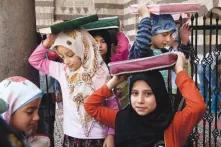Perspectives - Issue 12
Editorial
With this issue of Perspectives we want to shed some light on global governance and gender: to what extent are the decisions taken gender sensitive? Who makes the decisions? One focus will be on the UN Beijing +20 process. It was very much debated if a new declaration should be issued or not. Due to the backlash we face in many countries all around the globe, many feminists even did not want to revise the decisions taken at Beijing. Facing this backlash, Yasemin Öz discusses in her article the current necessity for an international struggle for women’s rights, resembling the one at the very beginning of the women’s movement.
When looking at the G20 process, the missing gender perspective becomes more than obvious, argues Bengi Akbulut in her article. When talking about a reduction of public finances and of privatization, women are much more affected than men. But who is aware of these very obvious arguments about gender inequality? When listening to the European Union’s debate about the debts of Greece, did anybody mention gender issues or raise concerns about the gendered implications?
A look into the regional developments from a gender perspective reveals the shocking cruelty of the so-called IS and of other radical Islamist groups in general and against women in particular. The bombardments of the international coalition might have led to a withdrawal of IS from certain areas, but until today there seems to be no strategy to force these groups to give up their attitudes against women. And those who buy women at the slave markets are not enough condemned by the international community. The impact on the role of women in the region most probably goes far beyond the territories under control of radical Islamic groups. These developments are a severe blow for democracy in the region in general.
The future of Turkey’s political system will very much depend on the result of the coming parliamentary elections in June. It is already obvious that they will occur in a very tense atmosphere: with the new law on internal security, political opposition is once more seriously disadvantaged. The upcoming months will prove if Turkey will be able to held free and fair elections with these new laws. Concerning the elections, the only positive development with a view to gender issues can be found in the quota and co-speaker-system of the pro-Kurdish party HDP. The social dynamic of this development and its impact on other political parties has an immense significance on the future representation of women in politics.
The AKP government will also be challenged with its foreign policy in the region: the 100th anniversary of the genocide against the Armenians will definitely have an impact on the public debate at the end of April 2015. From official reactions we understand that the government somehow accepts its crime against humanity but insists that this crime was accompanied by a crime committed by Armenians. For the public, the commemoration of Çanakkale, which underlined the Ottoman imperial power without any mention of the genocide at the same time was very disturbing. The ruling elite seems not yet able to cope with the past of the Ottoman Empire. This is especially significant as this government pretends to be establishing a “New Turkey” and hereby drawing a direct line to the Ottoman past; instead, it should have been of utmost importance to deal with Ottoman history from a human rights perspective and historical critical perspective. Furthermore, the flirtation of the government with radical Islamic opposition groups in Syria, Turkey’s role in the intervention in Yemen, and of course the regional developments of the Kurdish issue – all these factors will challenge the current government of Turkey. Until now, it has been difficult to trace a coherent foreign policy.
Before finishing, we would like to inform you about the changes in the Turkey Representation of Heinrich Böll Stiftung. After more than eleven years in this office, I transfer my duties as general director to Kristian Brakel. Then again we have two new colleagues who joined our team very recently: Bahar Şahin Fırat and Menekşe Kızıldere. Bahar will be responsible for Perspectives and our foreign policy program, while Menekşe will be in charge for our energy/ climate program.
Hoping that the elections in June will pass in peace and quiet and become a milestone on Turkey’s path to democratization...
On behalf of the Perspectives team
Ulrike Dufner














